Christian Race Realism, part 1: Introduction
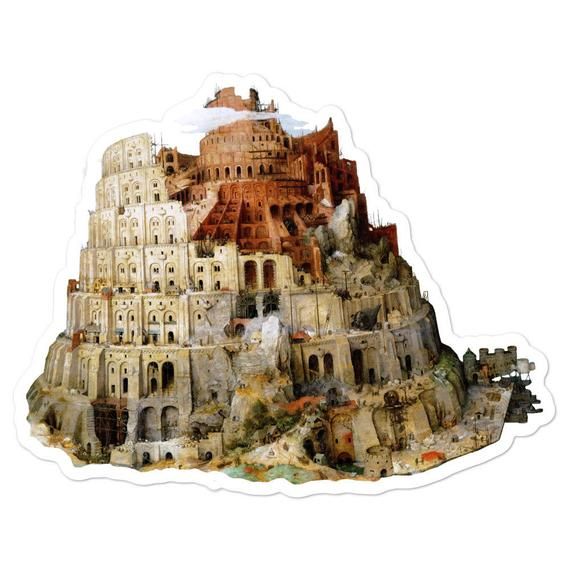
July 1st 2024
Race is real.
In the recent past most everyone agreed with this. Even children knew that “red and yellow, black and white” described real differences among mankind. And yet today, especially among white Christians, it seems quite common to deny it. “One race, the human race” is heard in pulpits, in church magazines and academic journals, and on social media. To quote but one example:
Perhaps the most important thing to say about race, in the typical American sense of the word, is that it does not exist. Unlike sex, it has no biological reality, and unlike ethnicity, it has no cultural reality. The human community simply is not divided into half-a-dozen (or whatever) racial groups united by distinct genetic markers or a common culture.
—David Van Drunen, “Reflections on Race and Racism” (Ordained Servant, March 2021, here).
This denial of race and its importance is a serious error, and a deadly one. Satan knows race is real, and is presently abusing its reality with great success. His servants on the left teach that “whiteness” is very real, and very bad. They notice “white privilege” (their term of spite for God’s real blessings on white men) and hate it, as the greatest evil on the earth. As Susan Sontag said here, “The white race is the cancer of human history.” And the only solution to this white cancer is its utter eradication. Another of their prophets said:
The goal of abolishing the white race is on its face so desirable that some may find it hard to believe that it could incur any opposition other than from committed white supremacists.
—Noel Ignatiev, here. About him, see more here.
The distinction such men make between eliminating whiteness and killing white people themselves is, as this quote shows, so thin as to be meaningless. They are gunning for white genocide. And so far it appears they have had good success: by feminism, birth control, abortion, demoralizing propaganda, war, pornography, perversion, and replacement through unfettered non-white immigration, the white man is, in relative terms, dying with alarming speed in his own lands. Consider this graph showing the trend of demographics in America:
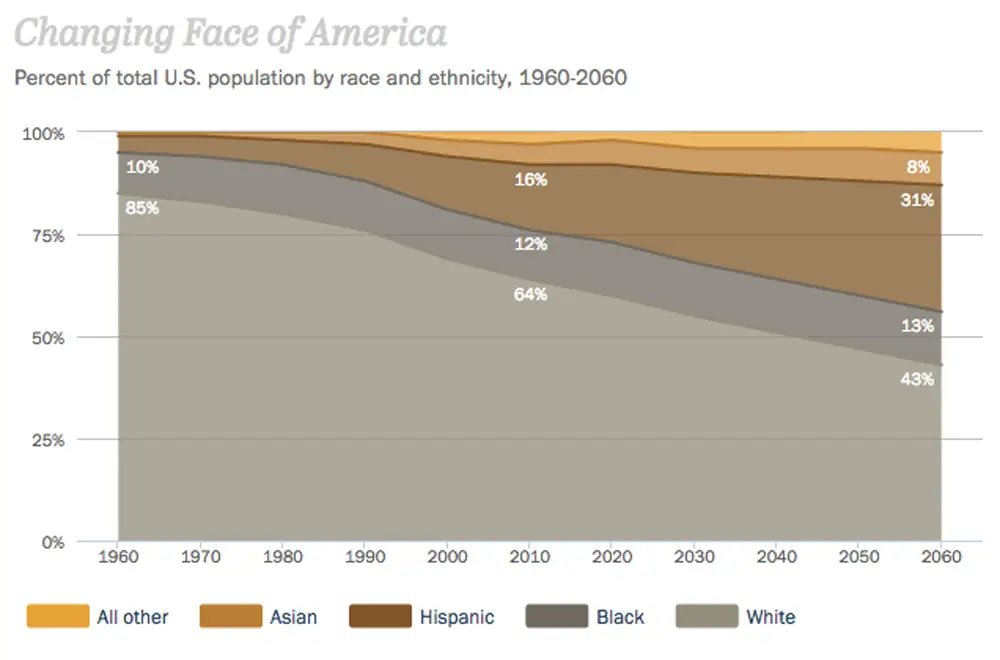
(Graphic from @AshaLogos). Nor is this merely a reduction in proportional demographics. Look at what happened to the livelihood of whites in 2021:
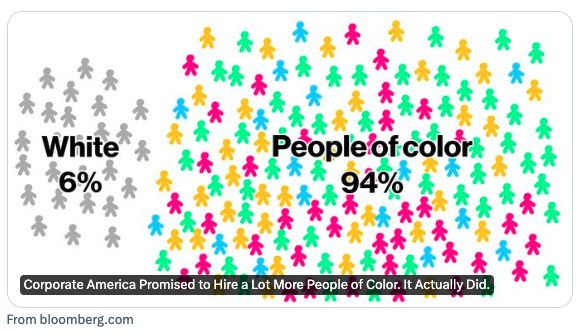
The article is here.
Nor is this merely an American phenomenon. Humza Yousaf, the former First Minister of Scotland (though himself a Pakistani), in 2020 gave a now-notorious rant against the predominance of white Scots in their own country. In South Africa, political rallies feature thousands shouting, “Kill the Boer!” This caught public attention last year:
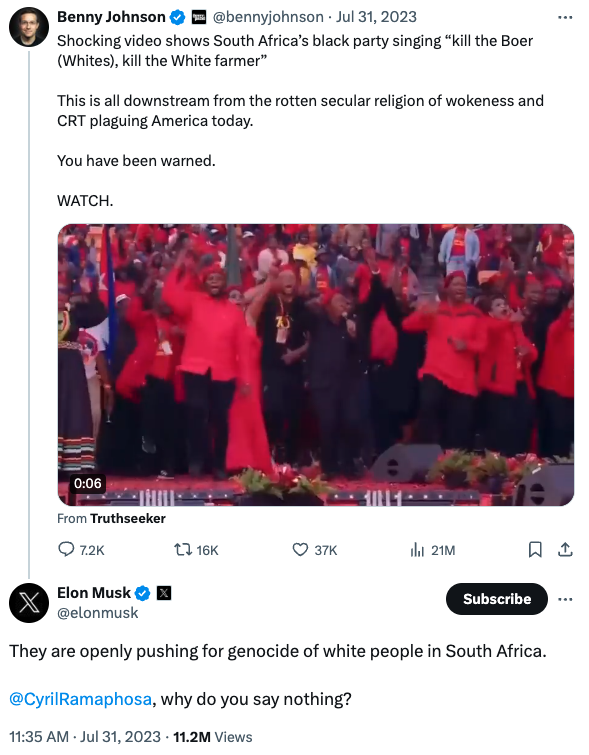
(Post and video here. The New York Times assured us “it should not be taken literally.”)
A name often used to describe this war on the white man is the “Great Replacement.” Sometimes its proponents try to fool others by denying its existence. But often they just celebrate it openly. Joseph Biden did so in this video, in which he said:
Folks like me who were Caucasian, of European descent for the first time in 2017 will be in an absolute minority in the United States of America, absolute minority. Fewer than fifty percent of the people in America from then and on will be white European stock. That’s not a bad thing. That’s a source of our strength.
For anyone that still suspects this claim of widespread global anti-white hatred is a baseless “conspiracy theory,” the recently-published book by Jeremy Carl, The Unprotected Class: How Anti-White Racism is Tearing America Apart, proves it is real, beyond all doubt.
This Satanic anti-white ideology they call “anti-racism,” but it should be clear, it is not anti-race. They believe firmly that race is real, and that whiteness, which is real, is evil.
White men, and especially white Christians, seem largely ignorant of this threat to their existence. But most of those who are actually aware of it propose a solution that makes matters worse. They think they have cut the Gordian Knot, when standing above it all they say, the problem with the “woke” is that they even care about race. “Colorblindness,” as they call it, is their proposed solution: “One race, the human race.”
But a moment’s thought should show this does not solve, but only dismisses the problem. If race isn’t real, then the white race isn’t real, which then implies it doesn’t matter that it’s being destroyed. The “Great Replacement,” if it exists, is not important. Race, they say, is only a social construct, so if one so-called race disappears, all that is lost is a mere theory, an academic fiction that enlightened people have no reason to uphold. “Good riddance to race” in our day necessarily means, “Good riddance to the white race.” With such a “conservative” anti-race-realism, Satan and his anti-white servants are all too happy to agree.
Such senselessness on race could be merely laughed off the stage, if its proponents were not so deadly serious. Within the white church these ideas are treated as unquestionable. It is not only that white men with names and platforms teach it (recall Van Drunen above). White leaders also threaten and enact grave punishments on fellow whites who disagree. The “racist,” the “kinist,” the “white nationalist,” the “white supremacist”—all terms describing white race realists—are mercilessly hounded by church power. If you doubt this, read this Aquila Report article (originally published by the leftist Southern Poverty Law Center) on what happened to an elder in the Presbyterian Church in America. Or see this post from an influential Baptist professor:
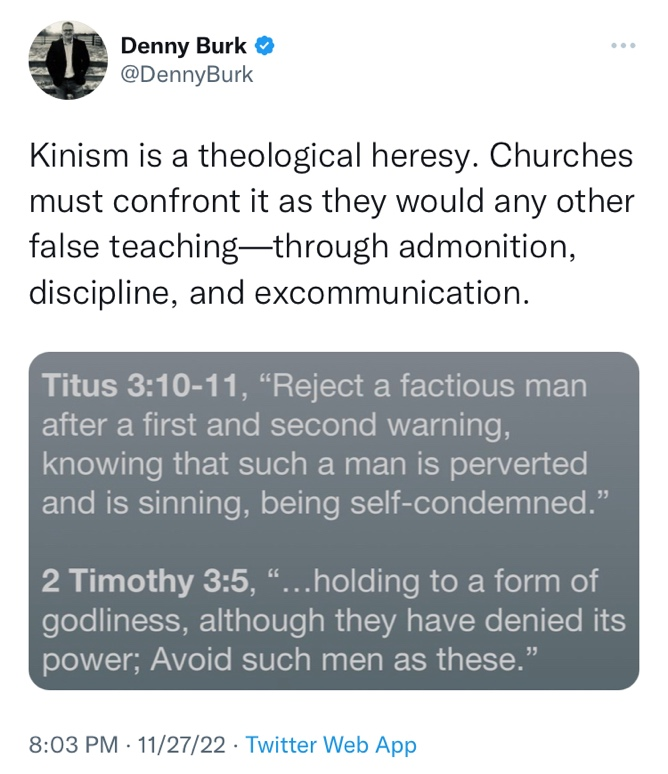
Or another such bold condemnation from a Presbyterian:
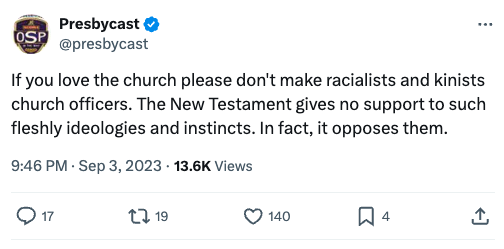
For longer examples of such denunciation, see this article by Doug Wilson, or this address by Owen Strachan. It appears from all these things that anti-race realism is the white church party line, which no one may cross with impunity.
But it gets worse. While some men push “colorblindness,” others push leftist racialism. A particularly sad example is Dr. Ligon Duncan, a celebrated churchman, who wrote a foreword to Eric Mason’s “anti-racist” book Woke Church. In it Duncan asks regarding his past lack of awareness as a white Christian of the so-called sin of racism,
How could I have been so utterly blind to my context? How did a sin that had pervaded my whole world growing up not even register to me as something to help preachers address…?
And then he charges his forbears with gross twisting of Scripture:
Specifically, during the eras of slavery, segregation, and civil rights, some of our best theological minds figured out how ‘love you neighbor’ did NOT apply to the racism and injustice (and, by the way, I mean injustice the way the Bible defines injustice) that black people were experiencing, oftentimes at the hands of professed Christians.
Duncan concludes regarding the book’s author, “I look forward to sitting at his feet to listen and learn.” You can read the whole foreword in Google Books, here. This is not to mention Duncan’s 2021 address celebrating the replacement of whites as “God’s plan to reverse secularism in the United States.”
Whether it’s Eric Mason, or Jemar Tisby, or Mika Edmonson, or this Westminster Seminary graduate who declared, “Whiteness is wicked,” many are teaching the principles of leftist anti-racism, often with explicit support from white church leaders.
What do we make of this? Our own pastors preach race isn’t real, punish their people for insisting otherwise, then praise those who teach leftist race consciousness, even as it fuels the fires burning down our nation and its churches.
This error and hypocrisy must be exposed, and against it the truth about race clearly taught and defended. To that end, this series of articles will seek to demonstrate and deal with the reality of race. With the Lord’s help, we aim in this article to define “race realism,” and in particular “Christian race realism,” and in the following articles to prove, defend, and apply it.
Race Realism Defined
Race realism is the recognition that mankind is divided into distinct races, that the differences between the races are large and relatively permanent, and that this racial diversity ought to be acknowledged, celebrated, and defended.
Note the elements of this definition:
Mankind. We do affirm “one human race.”
Distinct races. But we also affirm that the one race of man is divided into narrower races. In common English usage, “race” is flexible: it can speak of ethnicity on any scale, from all mankind, down to single tribe or clan. In these articles we will most commonly use “race” to speak of the largest ethnic divisions of mankind.
These divisions are variously described. To mention a few options:
– Sometimes we hear of two: white and non-white
– More often of three: white, black, and brown
– Or of four: red or Amerindian, yellow or Asian, black or African, and white or European
– Or of seven, as in the options given in the U.S. Census: White, Hispanic or Latino, Black or African American, Asian, American Indian or Alaska Native, Middle Eastern or North African, and Native Hawaiian or Pacific Islander.
– We could also speak in terms of biblical and ancient history, of Semites, Hamites, and Japhetites.
This variety is not necessarily contradictory, nor does it mean that discerning racial boundaries is impossible. It reflects the fact that divisions can be made according to different criteria (e.g. appearance, region, historical origin), and with varying levels of specificity and rigor. But even if there are irreconcilable differences among such classifications, it is not more than exists when attempting to explain the order of reality in any other field. Compare biologists’ debates over the taxonomy of non-human creatures: none take the fact of disagreement as a proof there are no meaningful distinctions to be made.
Moreover, we will sometimes distinguish “race” from “ethnicity” or “nationality,” using the latter two to speak more narrowly, usually according to presently established boundaries between nation-states: e.g. among whites, of English, Germans, or Dutch. If others use these terms differently, this is no real problem, as long as we agree in substance, that there are large ethnic categories that transcend family, clan, and nation, and that they are real.
The differences between the races are large. This means that race is not a matter of mere skin or mere geography (though we may name races after their skin-color or country for convenience). Rather, race goes deep, extending as we’ll show to countless other realities, physical, cultural, intellectual, moral, and spiritual.
And relatively permanent. We leave open here the question of racial change in the long term, of how new races may form by ethnogenesis, of peripheral cases where the races overlap, and of exactly how all racial difference is passed on (nature v. nurture, genetics v. epigenetics, etc.) These questions are interesting and useful in their place, but exact determination of them lies beyond the scope of this series. Racial differences arise and persist predictably and permanently enough that for all practical purposes, race is immutable. Whites are white, and blacks are black, and will remain so for our entire lifetime and beyond.
Racial diversity. We understand this term, not like the multiculturalists, as a ploy to colonize white nations with non-whites, and make whites ashamed of their own race and history, but as a grateful recognition of the fact that man exists in distinct races, and that in itself, this is a good thing.
Ought to be acknowledged, celebrated, and defended. Here we outline the application: we must name, praise, and protect racial distinctions. As in all other matters, we must think and live according to reality. The application will of course stir up the greatest opposition, but truth not practiced might as well not be taught. If race is real, real duties follow.
Christian Race Realism
This is the race realism we set out to defend. What then of our title, “Christian Race Realism”?
Christian race realism is no different in substance from what we’ve just defined. Truth itself is not changed when Christians affirm it. Christians ought to recognize that many non-Christians see racial realities, and many do so better than we do. In the fight for truth we ought to acknowledge our unbelieving allies, and even learn from them, even as we flee yoking ourselves together with their unbelief.
That said, we do seek and expect certain benefits from a self-consciously Christian presentation of these truths on race. First, by it we may supplement natural arguments, persuasive in their own right, with scriptural testimonies, which are divine, infallible, and unanswerable. We underline the word of creation with the word of the Creator himself: “Thus saith the Lord.” As we will see in the next article, Scripture has much to say on race.
Second, by it we make more explicit the role of God’s creation and providence in racial matters. God tells us that by creation he made man’s race (Gen. 1:27), and that by providence he made man’s races (Gen. 9–11; Deut. 32:8). As Paul says to the Greeks, God “hath made of one blood all nations of men for to dwell on all the face of the earth, and hath determined the times before appointed, and the bounds of their habitation” (Acts 17:26). This is a powerful antidote to materialist theories which employ race as a lever by which to pry men off from faith in God.
Third, by it we aim more directly and explicitly to apply these truths to the glory of God, which is man’s chief end, and to the true good of man under God. This will preclude all godless and inhumane answers to hard racial questions.
Fourth, by it we pursue a more specific defense and application of these truths for Christian individuals, Christian families, Christian churches, and Christian nations. This is a necessary but thorny subject, and we cannot expect unbelievers to address it for us well.
Fifth, by articulating a sound Christian race realism, we would lay the foundation for future political application of these truths under a more Christian government, which according to God’s promises, we long for and expect.
Sixth, we do this for the sake of our evangelism. Anyone with experience evangelizing in our egalitarian age knows, unbelievers often bring up questions about race. Moreover, if an unbeliever who is right about race realism hears the gospel from a Christian that he knows is wrong on it, it will be a barrier to his conversion.
Caveats
Finally, we would further clarify two matters so that we may not be misunderstood. First, race is natural, and earthly, and thus like all things under the sun, to set our heart on it is vanity and striving after wind. This does not mean race is not real, or not important. But race does not have ultimate importance. Heavenly things, God, Christ, the gospel, faith, hope, love, and so forth, are far more excellent. Grace excels race as far as heaven excels earth. Racial religious privileges are real, and can be a help unto salvation—God works in families, nations, and generations—but they never in themselves saved anyone. Paul, for example, speaks in this way of the privileges of Jews in Romans 9:1–8. There will be no ancestry test to enter glory: the sole criterion of the last judgment will be “faith which worketh by love” (Gal. 5:6).
Second, race realism is no excuse for error, sin, or schism. We have to underline this here, because of what we observed in the introduction, that even within the church, men will say the worst of those who would defend race realism, or the white race against its enemies. We assert here, and hope to prove beyond a doubt, that there is no inherent evil, falsehood, or scandal in the assertion of race realism. It is a truth of nature, and of Scripture—how could it then be blamed for sin?
Now, we would not join our enemies in exaggerating the sins of race realists. We would in fact plead with pastors and presbyteries, we race realists in your midst are not the godless troublemakers you have been told we are. If you would join the world in slandering us, you would be sinning, and also laying on us great temptation to respond in sin. This itself is a scandal, and schismatic.
Yet even so, we say here for all to see, that even under enormous pressure, race realists have no right to sin. We say this to clear our conscience, and our name. We testify that in this series our whole aim is to speak the truth in love, for edification, not destruction. May God bless our labors to that end.
Articles in this Series
Christian Race Realism
1. Introduction